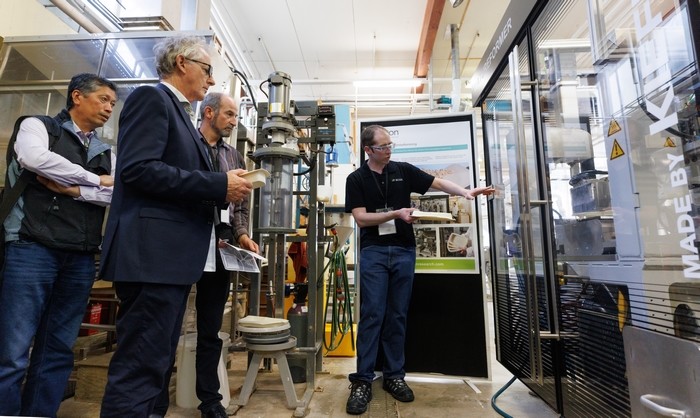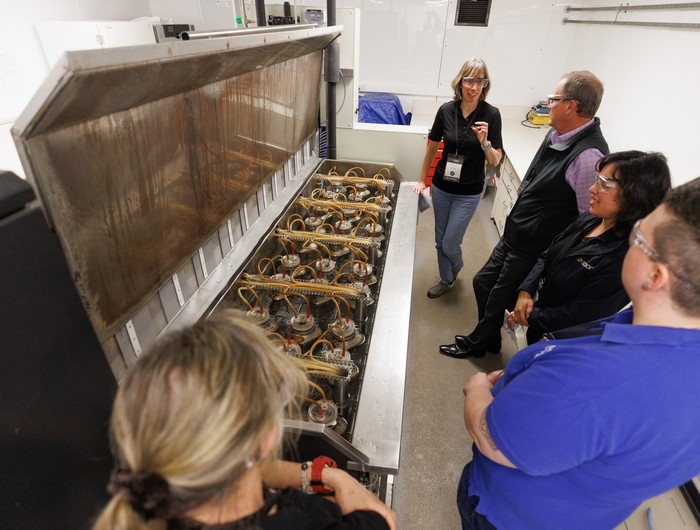Scion hosts thought-provoking packaging conference
14 November 2022
Reducing the impact of packaging on our environment requires a collective mindset shift about how products are designed and consumed if Aotearoa is to achieve ambitious packaging goals by 2025.
About 100 people who attended Scion’s Packaging Conference on November 10 heard that while many businesses are making great efforts to reduce the amount of plastic waste going to landfill, more collaboration is needed between industry, government, research organisations and consumers in order to accelerate the change in behaviours required to address Aotearoa’s alarming track record with waste.
Scion is a New Zealand leader of fibre-based and plastic-based packaging research and has recently invested more than $1 million in research and testing facilities to ensure global packaging commitments can be met for New Zealand products.
The conference was an opportunity for Scion scientists to take participants on a behind-the-scenes tour and share their specialist capabilities to demonstrate how working together, New Zealand businesses can create more reusable, recyclable or compostable packaging to reduce waste and emissions.
Alec Foster, Portfolio Leader for Bioplastics and Packaging, says it was fantastic to showcase Scion’s facilities and demonstrate how new technologies can provide industry with opportunities to innovate and solve New Zealand’s packaging challenges.
Keynote speaker Shaun Lewis from the Ministry for the Environment opened the one-day conference with sobering statistics. New Zealand is one of the highest generators of waste per person in the world, generating about 17.5 million tonnes of waste each year. Of that, about 70% or 12.5 million tonnes is sent to landfill.
In 2019, waste contributed about 4% of New Zealand’s greenhouse gas emissions and Lewis says the way New Zealand has been creating and managing waste isn’t sustainable.
“On average, we use too much, waste too much and we collect too much. But New Zealand cares deeply about the issue of waste and plastics. There’s a growing mood for change and this involves everyone.”
Lewis outlined the Government’s ambitious work programme to help New Zealand become a low waste, low emissions economy. This includes systems to transform waste management through strategy, legislation, expanding investment in the waste sector, phasing out hard-to-recycle plastics and regulations for product stewardship that puts responsibility for a product’s life cycle and waste management on manufacturers, importers, retailers and users.
The Ministry for the Environment also supports the New Zealand Plastic Packaging Declaration, a commitment that businesses can make towards using 100% reusable, recyclable or compostable packaging by 2025. The declaration was launched in 2018 on World Environment Day, following the Ellen MacArthur Foundation’s Global Commitment to encourage international corporations to start building a circular economy for plastic.
Countdown, Foodstuffs, New Zealand Post, Z Energy, Eco-Store and Fonterra are among New Zealand businesses to have signed the declaration to date.
Industry innovation
Many Kiwi businesses, including packaging manufacturers Sealed Air and Convex, are already innovating to support industry develop more eco-friendly packaging solutions.
Guest speaker Owen Embling, managing director of Convex, provided conference attendees with real-world examples of food-safe, compostable packaging. Andrew Fox, plastic technologist and sustainability champion with Sealed Air shared how the company is repurposing flexible packaging waste by converting it back into packaging products, reducing Sealed Air’s landfill deliveries by more than 70%.
Attendees also heard from Louise Nash, founder and chief executive of Circularity, a circular design and innovation partner that works with businesses and changemakers wanting to radically redesign their operations to be low carbon, regenerative and circular.
She says being “sustainable” in business is not enough because consumers and the planet are demanding more from industry. Nash is challenging businesses to “design out” the environmental impact of the linear take-make-waste system.
“One hundred billion tonnes of virgin materials are extracted from Earth every year for us as consumers, and less than 10% globally is recycled. We believe the future of business should work in tune with nature and not against it.”
She says recycling is the lowest value loop in the circular economy, taking a lot of energy and resources to process. More gains can be made by collaborating to radically redesign systems that hold current packaging problems in place.
“Changing our models from the top floor to the shop floor is how we’ll get the transformation we need. We must change how we view consumption and production,” Nash says.
“For a business to succeed it must understand it’s a subsidiary of the environment. Without a healthy environment, there are no shareholders, no employees and no customers.”
Lessons from Te Ao Māori
Jacqui Forbes was another speaker calling for systems innovation and a shift towards more circular models. She champions Para Kore, a kaupapa Māori zero waste education movement, and says Te Ao Māori offers wisdom that can help guide Aotearoa on its journey towards a low waste, low emissions circular bioeconomy.
“Imagine we become that country where reusable packaging is the norm.”
Wide-ranging views on the discussion panel explored these themes further. Russell Haines, managing director of innovation agency Memory, says industry and policymakers could benefit from applying a Te Ao Māori lens to the education required to take consumers with them.
“When we’re creating new premium value, premium is about purpose for a younger generation. Te Ao Māori provides an opportunity to explain why the circular bioeconomy has to happen. It helps tell the story for people to buy into.”
Internationally, many European countries have advanced waste management systems, reflecting a different mindset for how packaging and waste is valued. Countries like Germany where 70% of waste is recycled, have invested in infrastructure to support these systems, says Haines.
Rob Langford, chief executive of The Packaging Forum, adds that New Zealand companies shouldn’t be afraid to be bold, challenge the status quo and adopt proven models from overseas.
“It’s time for industry to work collaboratively to find better materials for packaging and use international knowledge to accelerate change.”


